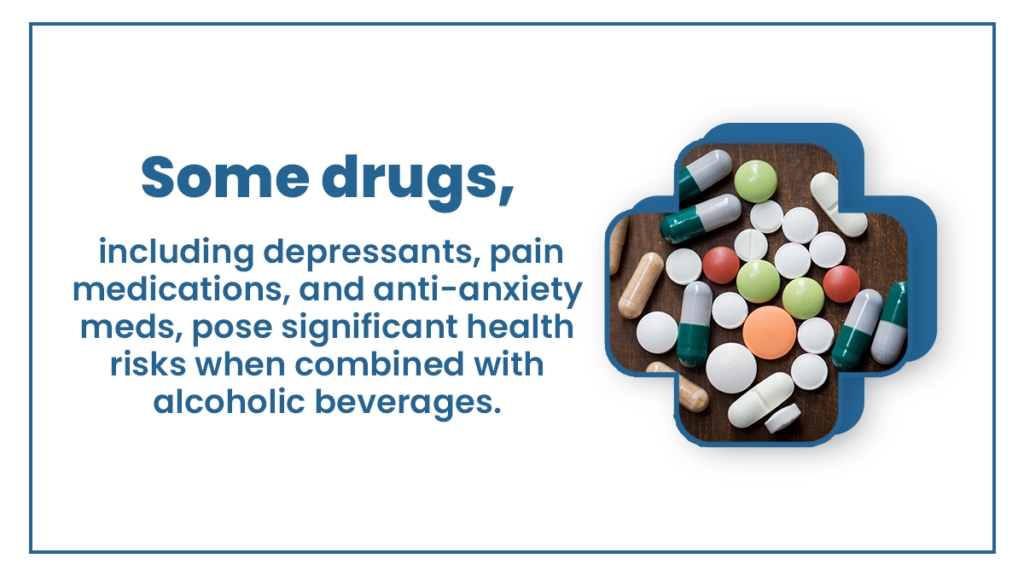Have you ever wondered about the consequences of consuming alcohol while taking prescription medications? Combining these substances can have significant effects on your health and well-being.

By being aware of the possible harmful interactions between alcohol and prescription drugs, you can make informed decisions and safeguard your health.
Key Takeaways
Drinking alcohol while taking prescription drugs is deadly. Here is what you need to know about this combo:
- Mixing alcohol with prescription drugs can lead to dangerous interactions, increased side effects, and an elevated risk of overdose.
- Some drugs, including depressants, pain medications, and anti-anxiety meds, pose significant health risks when combined with alcoholic beverages.
- Treatment options may include detox, inpatient and outpatient treatment, therapies, and support groups.
Are you struggling with alcohol and prescription medication abuse? Contact The Haven Detox-Little Rock at (501) 271-3342 for more information.
Risks of Mixing Prescription Drugs and Alcohol
Many people take medicines to stay healthy, and some also enjoy a drink now and then. It can be harmful and even deadly.
Let’s talk about why.
Dangerous Interactions
Alcohol and certain medications, such as sedatives or opioids, both depress the CNS. Combining them can intensify their effects, leading to extreme drowsiness, impaired motor control, and slowed breathing. These interactions pose a danger of accidents, falls, or respiratory failure.
Alcohol interferes with the liver’s ability to metabolize medications. This can increase drug levels in the body, potentially causing liver damage and other serious side effects.
Also, it is particularly important to exercise caution with medications with a narrow therapeutic index, where there is little difference between an effective dose and a toxic dose.
Increased Side Effects
Combining alcohol with medications that induce drowsiness, like antihistamines or sleep aids, can intensify sedative effects. Excessive sedation can lead to impaired cognitive function, memory loss, and an increased risk of accidents.
Alcohol irritates the stomach lining, and combining it with medications like nonsteroidal anti-inflammatory drugs (NSAIDs) can exacerbate gastrointestinal issues. This can result in stomach bleeding, ulcers, or other digestive complications.
Overdose Risk
Alcohol can interact with medications that affect heart rate and blood pressure, such as certain antidepressants. This interaction may lead to irregular heartbeat, high blood pressure, or even heart failure.
Combining alcohol with opioids or sedatives can cause severe respiratory depression, impairing the ability to breathe. This poses a significant risk of death.
Addiction
Regularly combining alcohol and prescription drugs can contribute to developing substance use disorders (SUDs) or exacerbating existing ones. Individuals may experience withdrawal symptoms or require higher doses of medications to achieve the desired effects, putting them at risk of addiction.
Commonly Mixed Prescription Drugs and Alcohol
Understanding the effects of mixing specific prescription drugs with alcohol is crucial for safeguarding health and well-being.
Painkillers and Alcohol
Prescription painkillers, like opioids (e.g., Vicodin and OxyContin), are potent. They’re great at tackling pain but can be addictive and sedating. Mixing them with alcohol is like turning up the dial on these effects.
The combination can dramatically slow breathing and impair judgment. Plus, it boosts the risk of an overdose – a gamble where the stakes are as high as your life.
Anti-Anxiety Medications and Alcohol
Anti-anxiety medications like benzodiazepines (e.g., Xanax and Valium) help smooth out the creases of anxiety. They are calming agents.
Alcohol is also a sedative. When you combine them, it’s like putting sedation into overdrive. This can lead to extreme relaxation, where even breathing becomes an effort. The aftermath? A higher risk of accidents and, in severe cases, respiratory failure.
Antidepressants and Alcohol
Antidepressants such as Prozac and Zoloft aim to lift the spirits. They target the brain chemicals that affect mood. However, alcohol is a depressant and can counteract the benefits of these medications.
Mixing them can make depression worse, cloud judgment, and amplify the dangerous side effects of the medication. It’s like trying to drive with a foggy windshield; nothing is clear, and navigating becomes treacherous.
Sleep Medications and Alcohol
People with insomnia often turn to sleep medications like Ambien. These medications slow down brain activity to help you sleep. Alcohol has a similar effect. Combine the two, and it’s like a lullaby that’s too effective.
This pairing can lead to intense drowsiness, memory problems, and difficulty breathing during sleep. In some cases, this could escalate to life-threatening respiratory depression.
ADHD Medications and Alcohol
ADHD medications like Adderall and Ritalin help in improving focus. However, mixing them with alcohol weaves a tangled web. Alcohol can mask the stimulating effects of these medications, which can lead to consuming excessive amounts of alcohol.
On the flip side, these medications can heighten alcohol’s effects on blood pressure and heart rate. This combination can lead to impaired judgment and an increased risk of alcohol poisoning.
Blood Thinners and Alcohol
Blood thinners, such as Warfarin, prevent blood clots. Alcohol can affect how blood thinners work, tipping the scales toward too much thinning. This raises the risk of bleeding.
Signs Indicating the Need for Addiction Treatment
Addiction to alcohol or prescription drugs can lead to adverse health consequences. Recognizing the signs that indicate the need for addiction treatment is essential for seeking help and starting the journey to recovery.
The following are some key signs to watch out for:
Increasing Tolerance and Dependence
Needing Higher Doses: Requiring higher amounts of alcohol or prescription drugs to achieve the desired high. This tolerance development can be a sign of addiction.
Withdrawal Symptoms: Experiencing withdrawal symptoms such as anxiety, tremors, sweating, or nausea when attempting to cut back or stop using alcohol or prescription drugs.
Neglecting Responsibilities and Relationships
Prioritizing Substance Use: Engaging in excessive drinking or drug use at the expense of fulfilling obligations at work, school, or home. This can lead to poor performance, absenteeism, or strained relationships.
Relationship Issues: Experiencing conflicts with loved ones due to the consequences of drug or alcohol abuse, such as lying, neglecting responsibilities, or engaging in risky behaviors.
Health and Psychological Effects
Physical Health Decline: Experiencing deteriorating health conditions related to alcohol or prescription drug use, such as liver damage, heart problems, or impaired motor control.
Emotional and Mental Health Issues: Experiencing mood swings, depression, anxiety, or cognitive difficulties due to alcohol or prescription drug abuse. These substances can disrupt the normal functioning of the central nervous system and exacerbate mental health conditions.
Failed Attempts to Quit
Unsuccessful Efforts to Stop: Repeatedly attempting to cut back or quit using alcohol or prescription drugs but failing to maintain sobriety for a significant period. This may indicate a loss of control and the need for professional help.
Cravings and Obsession: Experiencing intense cravings and a preoccupation with obtaining and using alcohol or prescription drugs. The substance may become the primary focus of your thoughts and actions.
Overview of Drug and Alcohol Addiction Treatment
Seeking appropriate treatment is essential for recovery and long-term well-being. Understanding the available treatment options is crucial for individuals and their loved ones seeking help.
The following overview provides key information on drug and alcohol use disorder (AUD) treatment:
Assessment and Evaluation: Comprehensive Evaluation: A healthcare professional conducts a thorough assessment to understand the individual’s addiction history, physical health, mental health, and social factors.
Detoxification (Detox): This is the initial step in addiction treatment, involving removing toxic substances from the body. Medical professionals supervise detox to ensure safety and manage withdrawal symptoms.
Inpatient/Residential Treatment: This type of treatment provides intensive care in a controlled setting under medical supervision. Individuals receive 24/7 support, counseling, and therapy to address the underlying causes of substance abuse.
Outpatient Treatment: This treatment allows individuals to live at home while attending therapy sessions and receiving support. It suits those with a stable home environment and mild to moderate addiction.
Medication-Assisted Treatment (MAT): MAT combines prescribed medications with counseling and behavioral therapies. It is effective for opioid or alcohol dependence, helping individuals manage cravings and withdrawal symptoms.
Counseling and Therapy: Counseling and therapy sessions address the psychological and emotional aspects of addiction. Cognitive behavioral therapy (CBT), motivational interviewing (MI), and support groups are crucial in building coping skills and relapse prevention.
Aftercare and Relapse Prevention: After completing a formal treatment program, individuals benefit from ongoing support through aftercare services, support groups, and relapse prevention strategies.
Frequently Asked Questions (FAQ)
What medications should you avoid while drinking alcohol?
Alcohol can interact negatively with many medications, leading to harmful effects. It’s particularly crucial to avoid alcohol when taking:
Opioid painkillers (e.g., Vicodin, OxyContin)
Benzodiazepines (e.g., Xanax, Valium)
Antidepressants (e.g., Prozac, Zoloft)
Sleep medications (e.g., Ambien, Lunesta)
ADHD medications (e.g., Adderall, Ritalin)
Blood thinners (e.g., Warfarin)
Diabetes medications (e.g., Metformin)
What medication makes you sick if you drink alcohol?
Antabuse (disulfiram) is a medication that makes you feel very sick if you drink alcohol. When you take Antabuse and drink alcohol, you may experience nausea, vomiting, headaches, chest pain, and difficulty breathing. Doctors give Antabuse to people trying to quit drinking, as it helps turn them away from alcohol.
How long can I consume alcohol after taking medicine?
How long you should wait to consume an alcoholic drink after taking medicine depends on the type of medicine. Some medicines need a few hours, while others need days or weeks.
Ask your doctor or pharmacist for advice. They can tell you the safe amount of time to wait so that the medicine and alcohol don’t mess with each other.
The Haven Detox-Little Rock: A Sanctuary of Healing
Ready to break free from the risky habit of mixing alcohol with prescription drugs? The Haven Detox-Little Rock is here to help you reclaim your health and well-being.
Our medical detox helps prepare you for treatment. Our residential treatment can help you feel confident to return to the world without substances.
But we don’t stop there! With evidence-based therapies like cognitive behavioral therapy, we dig deep to untangle the roots of drug addiction.
Don’t let another day slip by. You deserve health and happiness. Take that leap and let The Haven Detox be your safety net. Call us at (501) 271-3342.



